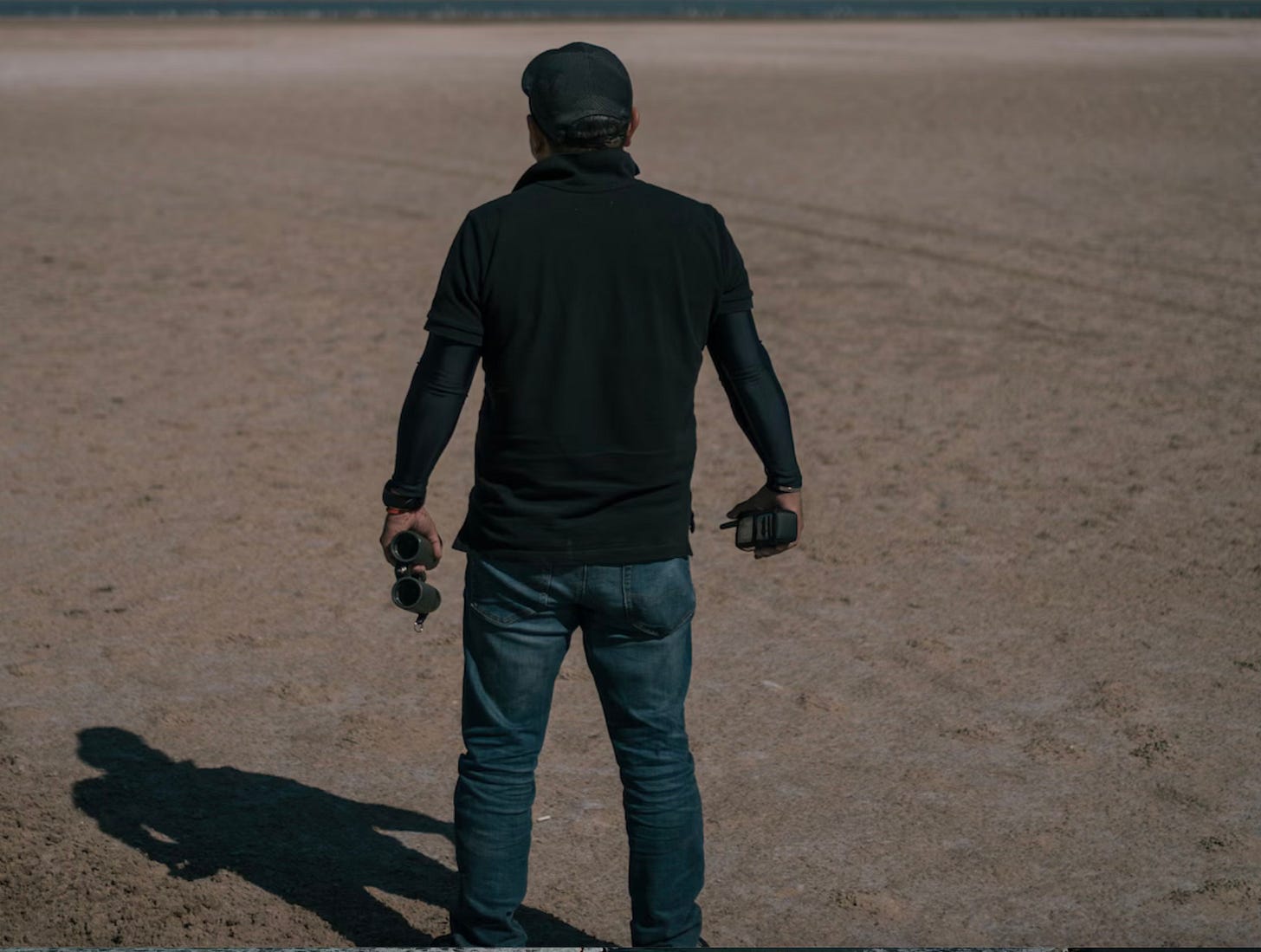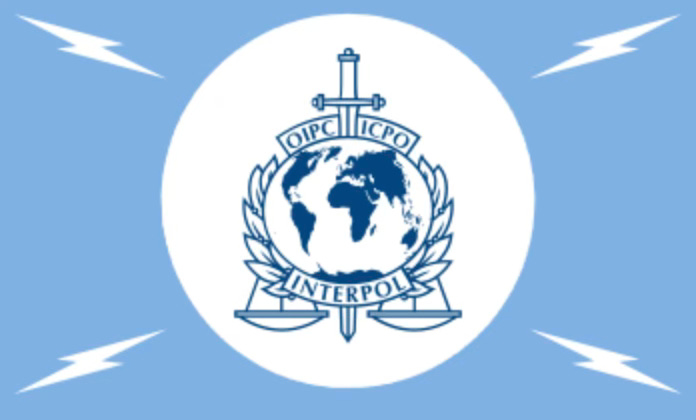The Gringo Hunters Apprehend Fugitives Fleeing US to Disappear in Mexico
Escape to Baja? Unlikely
Hola Amigos! Living in Mexico, occasionally you hear about gringos stepping outside the law. By owning a business, eventually everyone in our small town wandered across the bookstore’s threshold, some with pretty tall tales to tell. I wrote this article when I first heard about the Gringo Hunters because it was so quirky. There’s been a recent news update with a darker side to the story. Please read on. Also, Mexico fights back on the Gulf of Mexico name change kerfuffle in “Current Events” at bottom.
I'm sure you've seen movies or read books where the protagonist or anti-hero's future looks so iffy that their only recourse is to run—to Mexico. Even the GPS on OJ's Bronco was steering him to the Tijuana border until a parade of police cars on his tail called his bluff.
The question screams to be answered: What makes Mexico so appealing to the criminal mind? Is it the desire to disappear in a country awash with bountiful beaches, tequila, and fewer identity checks? Or do those who cross the border to escape justice hope the Mexico legal system is less sophisticated than that on the other side, and they'll be able to simply disappear into the vast rugged countryside?
Americans most wanted
Living south of the border, especially when we were new arrivals early on, it was impossible to not hear some over-the-top crimes that 'Americans' Most Wanted committed. The overall worst was the guy apprehended in 2002 at a campsite in bohemian Tulum, 60 miles south of Cancun. He'd murdered his wife and three children less than a month earlier in Oregon, and his despicable crime had earned him face time on "America's Most Wanted," a mere week before his capture. A Canadian tourist saw the episode and reported him to a crime hotline. Within 48 hours he was arrested on a nearby beach by 20 Mexican law enforcement officers along with several FBI agents from the American Embassy in Mexico City.
Interpol at work
Another incident took place in our pastoral pueblo, Puerto Morelos, in 2000, when a 30-something computer techie, wanted by Interpol unbeknownst to anyone in town, was apprehended for spearheading a pornography ring using local underage kids. He remained underground far too long. He’d ingratiated himself to the community by donating defibrillators for our town ambulance, occasionally driving it, doing good deeds. The big reveal occurred while we were up north one summer, and on returning, heard all the insidious details. There were other incidents but these two stand out. The memories of these Interpol arrests came rushing back to me after reading an article in The Washington Post 1about a police unit in Baja California whose sole job is to apprehend unpunished criminals making their escape across the US southern border.
In Baja, the unit is made up of state police—ten men and two women—who are assigned to apprehend them. Their agency is officially known as International Liaison Unit, but locally they have a catchier title—the Gringo Hunters.
Escape to Baja
Hoping to get lost in Mexico, with deserted beaches and sprawling cities that promise anonymity, "Escape to Baja" might sound like a sick idea for a tourist campaign aimed at criminals seeking cover. But—they’re gringos. No easy feat.
"Mexico appeals to those running from justice. Oftentimes it's just another guy who thinks he can create a new life in Mexico," Ivan, a former bodyguard and present member of the force, told Kevin Seiff, Washington Post reporter.
The unit catches an average of 14 Americans a month. Since its formation in 2002, more than 1,600 criminals have been apprehended. Many of those suspects were inspired by one of America's oldest cliches: The troubled outlaw striding into Mexico in the hope of disappearing forever, explains Moises, who heads up the elite unit targeting wayward gringo desperados.
Bad guys aplenty
"Regular people don't know how many bad guys are out there," he told reporter Seiff. "We catch about 140 to 150 a year, and they just keep coming. It's like they all came on the same bus or something.
"You can find them everywhere," Moises continued. "On a beach, at night clubs, in cars with sex workers, in a Carl's Junior parking lot. Some have new identities, some have had plastic surgery, some were found dead. We've found amateur surfers to Playboy models on the run.”
Blending in? Unlikely
"It's like they think, I can go and hide there and the police will never find me. A lot of them are white guys who think they can blend in, but they can't. The way they dress, talk, express themselves. It's totally different from the locals. They stand out."
One of the two women on the team, Abigail Esparza Reyes’, strategy used a daring process to out gringo criminals. By posting numerous profiles on Facebook as a woman looking to hook-up, it was easy to catfish them. She put herself out there because of the high stakes. Gringos who've committed crimes and come to Mexico can repeat the same crimes on her side of the border, making it less safe.
She told reporter Seiff about a sex offender who'd fled the US after being charged. He skipped justice system preliminaries, escaped to Mexico, and parked himself in an apartment near an elementary school where he could duplicate his previous crimes. The Gringo Hunters apprehended him.
Laying low
The unit always works under cover. While Seiff was conducting the interview, they were given a tip on the whereabouts of a fugitive murderer—a Mexican American from Fresno who had murdered someone at a traffic accident. They got a tip that he was cutting hair at a local Tijuana barber shop.
Seiff waited with Ivan and Abigail outside the shop, and finally, the man who fit the description walked out. Abigail approached him and Ivan cuffed him. He'd been on the run for two years.
Enroute to the border to hand him back over to US police, Seiff asked Ivan if he could ask the fugitive some questions. Ivan agreed.
"Why didn't you go further into Mexico? Why stay so close to the border?"
"I was tired," the American fugitive admitted.
Border exchange
At the border, the Mexican unit walked the man across in front of the lines of people waiting to cross into Mexico. As they approached the police, they uncuffed the suspect and the US police placed handcuffs on the man. The Gringo Hunters had just apprehended an alleged murderer. A gringo back in gringo hands.
Moises later told Seiff that sometimes when he's hanging out with friends who aren't cops, he gets the feeling regular people aren't aware how often they rub shoulders with marginal people. They don't know how scary it is to catch bad guys. His final words to Seiff were these, "Sometimes when I see US criminals all day, it shapes the way I see the States. We've caught an infinite number of Americans. It never ends.
"Chasing US criminals makes it seem like everyone there is armed. I'm living next to a country where everyone has a gun. Unsafe."
How strange, Seiff thought. It was the same lament he heard so often from Americans, the way they talk about a lawless Mexico.
Unfortunately I have a sad update to this story. A convicted murderer who escaped from California custody last year killed Abigail Esparza Reyes. Reyes, who had worked in the Baja unit since the Gringo Hunters’ inception, had reached the top tier. She was unit leader.
The Gringo Hunters were attempting to arrest a suspect in Tijuana when the man opened fire, hitting and killing 33-year-old Reyes. Local media identified him as Cesar Hernandez, 34, who California officials said escaped custody in December, 2024, during a court transfer. He was on his way to Kern County Courthouse for a judicial appearance when he jumped from the van and escaped.
The suspect fled to Mexico. Months later, this April, the Gringo Hunters caught up to him in Tijuana after receiving reports that he was staying in a home there.
A shootout erupted and Abigail was fatally shot. Hernandez managed to escape from the scene.
Marina del Pilar, governor of Baja California, offered condolences for Esparza Reyes' death. To the family of Officer Abigail she said, "Abigail's life will be honored, and her death will not go unpunished. We recognize her bravery and dedication.”
Esparza Reyes had led the regional team of the unit, carrying out more than 400 operations aimed at arresting U.S. fugitives who had fled to Mexico, Reuters reported. 2
The Los Angeles Times reported a week later that the suspect, Cesar Hernandez, was recaptured in Tijuana April 18 by Mexican authorities. The operation to target him was called, Gacela, nickname for gazelle.3
Kevin Seiff. “A US Murder Suspect Fled to Mexico. The Gringo Hunters were waiting.” “The Washington Post.” (June 3, 2022).
Lizbeth Diaz. “Mexican police officer killed by American in Tijuana.” Reuters News Agency. (April 11, 2025).
Clara Hunter. “Convicted killer who escaped from California custody, allegedly shot Mexican police officer, is recaptured.” (April 18, 2025).
MEXICO NEWS / CURRENT EVENTS
From Yucatan Magazine*— “Mexico has sued Google for updating its maps platforms, renaming the Gulf of Mexico the “Gulf of America.” The name change followed an edict from President Trump and appears only for users in the United States.
The body of water has been called the Gulf of Mexico for over 400 years.
Recent polls, including one conducted by the conservative Fox News network, showed that almost 70% of U.S. voters opposed renaming the Gulf, making it one of the least popular actions of his busy first 100 days.
Mexican President Claudia Sheinbaum announced May 9 that the lawsuit was filed, but she did not provide further details. Mexico has argued that the Gulf of America label should only apply to the part over the U.S. continental shelf. According to Sovereign Limits, a database of international boundaries, the U.S. controls about 46% of the Gulf, Mexico controls about 49%, and Cuba controls about 5%.”
*Carlos Rosada van Der Gracht. “Mexico Sues Google Renaming the Gulf of Mexico.” Yucatán Magazine. (May 10, 2025).
And if you’re interested in supporting independent journalism and writing, please consider a paid subscription to Mexico Soul. This is a free newsletter. I don’t paywall any of my posts, but you can choose to pay if you like what I deliver. It would mean the world to me and will keep you up to date on my posts and chapters from Where the Sky is Born—how we bought land and built a house in a small fishing village on the Mexico Caribbean coast. Not to mention a bookstore, too! All for $5/monthly or $50 per year.
If you enjoyed this article, please remember to hit the heart button to like it.
MY BACKSTORY—Puerto Morelos sits 100 miles from four major pyramid sites: Chichen Itza, Coba, Tulum and Ek Balam. Living in close proximity to this Maya wonderland made it easy to pyramid hop on our days off from Alma Libre Libros, the bookstore we founded in 1997. Owning a bookstore made it easy to order every possible book I could find on the Maya and their culture, the pyramids and the archeologists who dug at these sites and the scholars who wrote about them. I became a self-taught Mayaphile and eventually website publishers, Mexican newspapers and magazines, even guidebooks asked me to write for them about the Maya and Mexico. I’m still enthralled by the culture and history and glad there’s always new news emerging for me to report on right here on Mexico Soul.












Thanks for the restack Constance. What I've noticed on the east coast is that MX has its own "social services" department (and I'm writing this a bit tongue in cheek) in that the family unit is every person's 'social security assistance.' Family is really important. QRoo is a new state, so unlike large old and ancient cities, there is less 'baggage,' and ostensibly speaking, there usually is employment due to the burgeoning tourist industry. So really, you do not see homelessness. I'm sorry to hear about the problems in Baja Sur. Are these people local? Progreso on the Gulf does have occasional people in need, but the town seems to assist them. But you are correct, some do not seem to want the help.
Glad you wrote this article. Wish, I'd thought of it years ago. I had an old American friend who lived in Costa Esmeralda for many years---and I guess 30 years ago I visited him while heading south. In our conversation I learned a federale would stop by every few months to learn if he knew of any questionable North Americans in the area. Unrelated but in the same area they picked up a pedophile who had moved in with a local lady. Thanks for a great read--bill kaliher